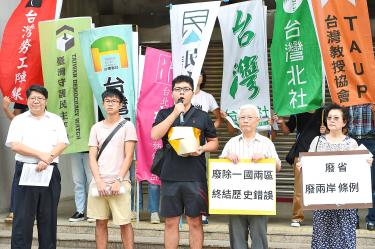The Legislative Yuan should initiate the final steps to abolish the Taiwan Provincial Government to follow up on a planned elimination of the Mongolian and Tibetan Affairs Commission, protesters said yesterday.
About a dozen members affiliated with the Economic Democracy Union and several other groups protested outside a Legislative Yuan side gate to demand that the Provincial Government’s budget be eliminated during the upcoming legislative session, followed by formal legal amendments to legislate it out of existence next year.
They also called for the Democratic Progressive Party (DPP) to make abolishing the Act Governing Relations Between the People of the Taiwan Area and the Mainland Area (臺灣地區與大陸地區人民關係條例) a platform plank during the next round of legislative elections.
“We hope to make the sovereign power of Taiwanese collide with our Republic of China Constitution,” union spokesman Chien Nien-yu (簡年佑) said. “Legal changes by the Legislative Yuan can challenge inappropriate constitutional restrictions and create new energy for a new constitution or sweeping reform.”
The Republic of China Constitution was adopted by the Chinese Nationalist Party (KMT) government in Nanjing in 1947, with amendments restricting its application to the nation’s “free area” following the KMT’s defeat in the Chinese Civil War.
The Constitution mandates the existence of a provincial government while allowing for legislation to define its specific function and organization.
In practice, the provincial government has been “frozen” and largely non-functional since 1998, when it was drastically downsized.
Protesters yesterday compared it to an “appendix.”
“Even though the provincial government has been frozen for almost 20 years, it still employees more than 100 people across several different bodies, while wasting NT$240 million [US$7.98 million] in taxpayer dollars last year,” said union secretary-general Chen Kuan-yu (陳冠宇), who also announced plans to burn a pile of paper “gold ingots” at a vigil at Liberty Square on Monday night.
Protesters said the vigil date was selected because it corresponded with the 25th anniversary of the promulgation of the Act Governing Relations between the People of the Taiwan Area and the Mainland Area.
“It would not be enough just to amend the act to change references to ‘mainland area’ to ‘China’ and references to the ‘Taiwan area’ to ‘our country,’” Lai Chung-chiang (賴中強) said, calling for restrictions on executive power to regulate Chinese trade and investment.
“The key characteristic of the act is numerous blank checks allowing the executive branch to do as it pleases on a variety of issues where they should be governed by specific laws,” Lai said.
The law should be replaced with a China Relations Act in the medium term to allow transition for articles governing behavior of Chinese citizens to be written into individual legislative acts to mirror passages “for foreigners.”
“Right now, Chinese are legally considered special nationals of the Republic of China, but we want to change that to their being considered special foreigners,” he said, adding that his group does not advocate using a referendum to abolish the act.
Referendums have “more important uses,” he said.
Source: Taipei Times - 2017/09/16





















